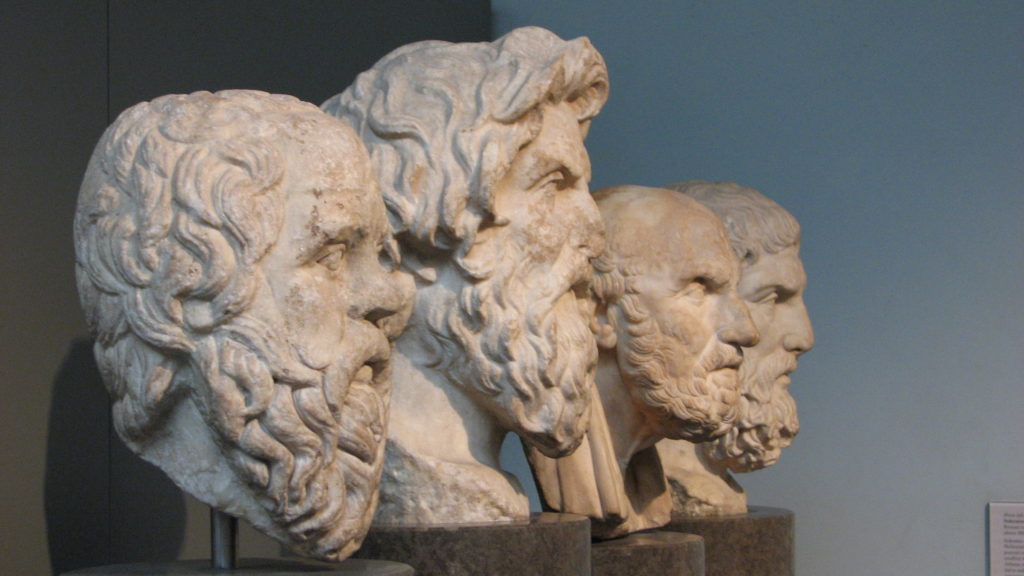
Acts 17

Acts 17:6, Turned the world upside down. Can it be said of us that we have turned the world around us upside down for Yeshua with the message of the gospel? Has the reputation that we are “Bible thumpers” and “Jesus freaks” preceded us as it did these saints in the book of Acts? Are we, as they were, persecuted and badly treated because of the witness of our faith?
Acts 17:11, Searched the Scriptures daily. Let us not forget that the only Scriptures the saints at this time was the Tanakh or Old Testament, which, in itself, contains the entire gospel message and all that humans need for salvation. The Testimony of Yeshua or New Testament is simply “frosting on the cake” in that it merely confirms the Truth of the Tanakh and is the only divinely inspired commentary on the Tankah.
Acts 17:17, Reasoned [discussed or disputed]…in the marketplace. What is our modern market place? With whom in the public arena are we discussing the gospel on a regular basis? Are we being lights on a hill and being salt and light to the world as Yeshua instructed? Let’s be honest. There is always room for improvement in our fulfilling Yeshua’s command, known as the great commission, to go ye therefore into all the world and to preach the gospel.

Epicurean and Stoic philosophers. The missionary minded saints of Athens placed themselves in the marketplace of ideas where they reasoned or disputed with the proponents of the leading philosophies of the day including Epicureanism and Stoicism. By that day, belief of divine influence (i.e. god and goddess worship) was waning and humanistic philosophies involving individualistic paths of spirituality were the fad of the day that were replacing organized religion and the superstitious belief systems that accompanied religious systems. This is not unlike our day where church attendance is down and people are seeking spiritual alternatives to fill the void that irreligious lifestyles and secular mindsets leaves in their wake. The saints’ response to this religious confusion in society was to preach the gospel and to reason with those who were lost and confused.
In light of this present societal condition, what is the evangelistically mind saint supposed to do?
Before answering this question, an issue first needs to be discussed. A problem exists in our day that did not exist in the days of the first century believers. The secular Greeks had never heard the gospel message before, and so it was a new and potentially exciting philosophy. We, now, are confronted with the reality that most people have heard of Christianity, about the Christian church and know something about the gospel, even though it may only be a sparse tidbit of information or some twisted caricature of the truth. Nevertheless, most people, based on this scanty or misguided perception, have chosen to reject the message of Yeshua the Messiah, and so preaching the gospel to those who have wilfully closed and hardened their hearts and minds to the good news provides a challenge to those seeking to fulfill the great commission of Yeshua to preach the gospel to the world.
Upon closer look, the philosophies of ancient Greece are not all that dissimilar than many of the prevailing and popular spiritual and philosophical paths that people are following in our day. For example, Epicureanism was a philosophy that sought to enjoy this physical life to the fullest without going to extremes. It championed the idea of self-fulfillment and trying to be a basically good person, while, at the same time, indulging the physical senses and satiating the basic pleasures of the flesh. Does that not sound like a lot of people we know who try to live a good life while having fun and refusing to be constrained by the strict and rather archaic values and morals of the Bible? Its chief competitor was Stoicism, which can be summed up as rolling with the punches while trying to be a good person. Let’s look at these philosophies a little closer and then compare them with what we see going on around us today.
“Epicureanism is a system of philosophy founded around 307 BC based upon the teachings of the ancient Greek philosopher Epicurus. Epicureanism was originally a challenge to Platonism. Later its main opponent became Stoicism… Epicurus was an atomic materialist, following in the steps of Democritus. His materialism led him to a general attack on superstition and divine intervention. Following the Cyrenaic philosopher Aristippus, Epicurus believed that the greatest good was to seek modest, sustainable pleasure in the form of a state of ataraxia (tranquility and freedom from fear) and aponia (the absence of bodily pain) through knowledge of the workings of the world and limiting desires. Correspondingly, Epicurus and his followers generally withdrew from politics because it could lead to frustrations and ambitions which can directly conflict with the Epicurean pursuit for peace of mind and virtues…Although Epicureanism is a form of hedonism insofar as it declares pleasure to be its sole intrinsic goal, the concept that the absence of pain and fear constitutes the greatest pleasure, and its advocacy of a simple life, make it very different from “hedonism” as colloquially understood…Epicureanism flourished in the Late Hellenistic era and during the Roman era, and many Epicurean communities were established, such as those in Antiochia, Alexandria, Rhodes, and Herculaneum. By the late 3rd century CE Epicureanism all but died out, being opposed by other philosophies (mainly Neoplatonism)” (https://en.wikipedia.org/wiki/Epicureanism).
The other prevailing Greek philosophy was Stocism. This philosophy is also alive and well in our day, even as Epicreanism is. Defined, “Stoicism is a school of Hellenistic philosophy founded by Zeno of Citium in Athens in the early 3rd century BC. It is a philosophy of personal ethics informed by its system of logic and its views on the natural world. According to its teachings, as social beings, the path to eudaimonia (happiness, or blessedness) is found in accepting the moment as it presents itself, by not allowing oneself to be controlled by the desire for pleasure or by the fear of pain, by using one’s mind to understand the world and to do one’s part in nature’s plan, and by working together and treating others fairly and justly. The Stoics are especially known for teaching that “virtue is the only good” for human beings, and those external things—such as health, wealth, and pleasure—are not good or bad in themselves (adiaphora), but have value as “material for virtue to act upon”. Alongside Aristotelian ethics, the Stoic tradition forms one of the major founding approaches to virtue ethics. The Stoics also held that certain destructive emotions resulted from errors of judgment, and they believed people should aim to maintain a will (called prohairesis) that is “in accordance with nature”. Because of this, the Stoics thought the best indication of an individual’s philosophy was not what a person said but how a person behaved. To live a good life, one had to understand the rules of the natural order since they thought everything was rooted in nature” (https://en.wikipedia.org/wiki/Stoicism).
As we can see, the influences of Epicureanism and Stoicism are still with us today. Should we be surprised? After all, there is nothing new under the sun!
So now returning to our original question, what is the saint to do in light of the societal trend to abandon the Christian religion, church and biblical values for any one of a number of popularly trending philosophies or admixtures thereof that are bobbing about on the seas of human ideas and vicissitudes? The bottom line is that in reality nothing has changed. Humans are still humans. They are still sin-bent, still have a hunger for spirituality, while at the same time rebelliously disinclined to submit to the instructions and laws of the Creator as found in the Bible. At the same time, Yeshua’s marching orders to his disciples have never changed: preach the gospel message of hope and love, be salt and light to those around us, love one another and those around us by manifesting the fruit of the Spirit, lift up the name of Yeshua and the message of the cross, and be a spiritual seed planter wherever one goes. Let YHVH through his Spirit do the watering and fertilizing of that seed by convicting the world of sin, righteousness and judgment. YHVH will bring in the harvest to his kingdom how and when he wants. It is our job to be our Father’s business and to leave the rest to him.

Acts 17:24–32, Paul’s model for one-on-one evangelism. In Paul’s encounter with the Greek philosophers on Mars Hill, he uses the five step evangelistic approach that Yeshua used as recorded in his encounter with the rich young ruler in Mark 10:17–22). This five-step approach is as follows:
- Paul first establishes the character and nature of the one true YHVH Elohim who is the Creator of all things and man should seek him, for man owes all to him (vv. 24–28).
- Then Paul shows how the Greeks have not been following the true Elohim, but have been sinning by worshiping false gods (i.e. idolatry), which is a violation of the Torah (v. 29).
- Next, Paul further alludes to the Torah by establishing that Elohim’s divine nature or character (which is revealed in the Torah) transcends idols, material possessions or anything else devised by men whether artistic or philosophical in nature (v. 29). These things were the chief false gods of the ancient Greeks, for which Paul was taking them to task.
- Paul then tells the Greeks that Elohim is calling men to repentance for ignorantly following man-made idols and philosophies, (which is sin, or Torahlessness, 1 John 3:4) (vv. 30–31).
- After this, Paul points the Greeks to Yeshua (vv. 30–31).
From this evangelistic encounter, Paul gained some converts (v. 34).


Tehillim 23:1 Adonai is my shepherd; I lack nothing.
(He who has no want, already has everything!)
Shalom, John
this bears repeating-there is nothing new under the sun-but above the sun is the SON and He makes all things new!